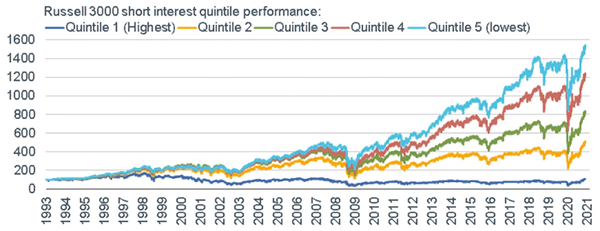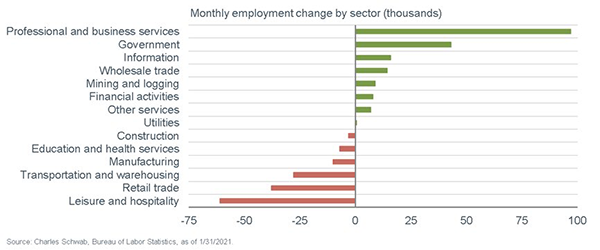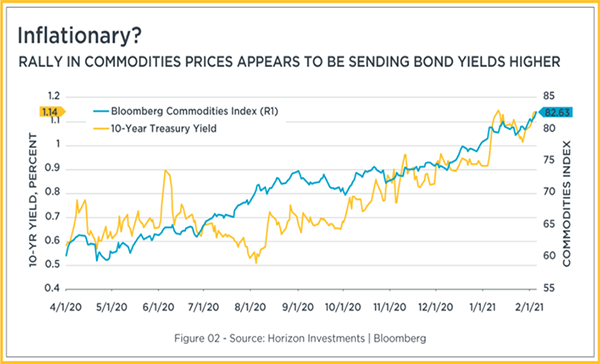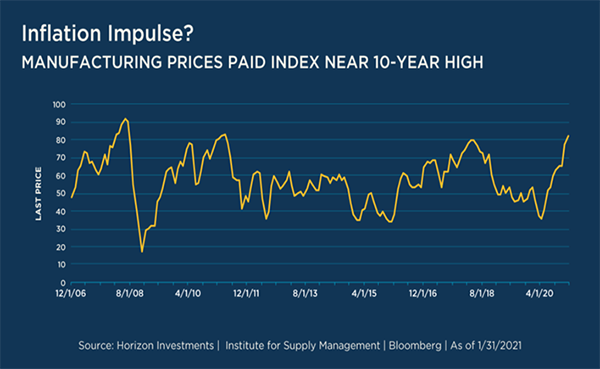The GameStop mania appears to be fading as quickly as it appeared, with shares down roughly 70% last week. As the chart below shows, the stocks that are the most heavily shorted (or bet against) have the worst performance over time — and stocks that are shorted the least have much better results. The reason this is true? Company fundamentals. The recent spike in the most heavily shorted stocks is an aberration, not a common occurrence.

The markets now are able to focus again on the positive macro-economic backdrop: liquidity in the economy, vaccines in arms and low interest rates. The S&P 500 and NASDAQ both hit record highs last week, as investors are focusing on what the future holds rather than where the economy is today. Speaking of the economy, the U.S. unemployment rate fell from 6.7% in December to a lower-than-expected 6.3% in January, the lowest level since the pandemic started. Some people found new jobs, while others left the workforce entirely. Gains were seen in professional and business services, as well as in government employment, while retail, leisure and hospitality jobs continue to suffer.

Treasury bond yields also rose last week, reaching levels not seen since March. If inflation remains in check, the Fed can keep monetary policy easy, which helps bonds and provides diversification from stocks. The services sector, the largest piece of the Consumer Price Index, continues to fall, contributing to the lower level of inflation — whereas commodity prices (especially oil) are seeing a resurgence in price as supplies are starting to decrease. This also affects the Manufacturing Prices Paid Index, which also is trading at nearly a 10-year high, as higher commodity prices flow through to the cost of producing goods.


We do expect to see some inflation volatility in the near to medium term as economic activity resumes and price comparisons with weaker numbers from last year push inflation higher. We do not expect these effects to result in sustained inflationary pressure, and we anticipate that the trend will reverse in the second half of the year, after the economy reopens further.
So, what can we learn from all this? The vaccination rollout, U.S. monetary policy with regard to inflation and an additional stimulus all play an important role in direction of the market in 2021, with potential for further upside growth. We will continue to stay the course, and while we know there will be bumps in the road in 2021, the public markets will continue to look forward, anticipating what is ahead.
From an investment perspective, we use the above insights to help with the strategic and tactical asset allocation based on where we see the portfolio heading over the next five to seven years, with short-term adjustments along the way. We are not trying to time the market, but we will try to take advantage when we see where the market is heading. Having a well-balanced, diversified, liquid portfolio and a financial plan are keys to successful investing. The best option is to stick with a broadly diversified portfolio that can help you achieve your own specific financial goals – regardless of market volatility. Long-term fundamentals are what matter.
Sources: Horizon Investments, Bureau of Labor Statistics, Charles Schwab
_____
This material contains an assessment of the market and economic environment at a specific point in time and is not intended to be a forecast of future events, or a guarantee of future results. Forward-looking statements are subject to certain risks and uncertainties. Actual results, performance, or achievements may differ materially from those expressed or implied. Information is based on data gathered from what we believe are reliable sources.
Using diversification as part of your investment strategy neither assures nor guarantees better performance and cannot protect against loss of principal due to changing market conditions.
Past performance is not a guarantee of future results.
The MSCI Europe Index is a free float-adjusted market capitalization weighted index that is designed to measure the equity market performance of the developed markets in Europe. The MSCI EAFE Index (Europe, Australasia, Far East) is a free float-adjusted market capitalization index that is designed to measure the equity market performance of developed markets, excluding the US & Canada. The MSCI World Index is a free float-adjusted market capitalization weighted index that is designed to measure the equity market performance of developed markets. The MSCI Emerging Markets Index is a free float-adjusted market capitalization index that is designed to measure equity market performance of emerging markets. The MSCI AC (All Country) Asia ex Japan Index is a free float-adjusted market capitalization weighted index that is designed to measure the equity market performance of Asia, excluding Japan. The Dow Jones Industrial Average is a popular indicator of the stock market based on the average closing prices of 30 active U.S. stocks representative of the overall economy.
S&P 500 Index is an unmanaged group of securities considered to be representative of the stock market in general. NASDAQ Composite Index measures all NASDAQ domestic and international based common type stocks listed on The NASDAQ Stock Market. The Russell 2000 Index measures the performance of the small-cap segment of the U.S. equity universe. It is not possible to invest directly in an index.
The opinions expressed in this commentary are those of the author and may not necessarily reflect those held by Kestra Investment Services, LLC or Kestra Advisory Services, LLC. This is for general information only and is not intended to provide specific investment advice or recommendations for any individual. It is suggested that you consult your financial professional, attorney, or tax advisor with regard to your individual situation.
Securities offered through Kestra Investment Services, LLC (Kestra IS), member FINRA/SIPC. Investment Advisory Services offered through Kestra Advisory Services, LLC (Kestra AS) an affiliate of Kestra IS. Kestra IS and Kestra AS are not affiliated with CD Wealth Management.





